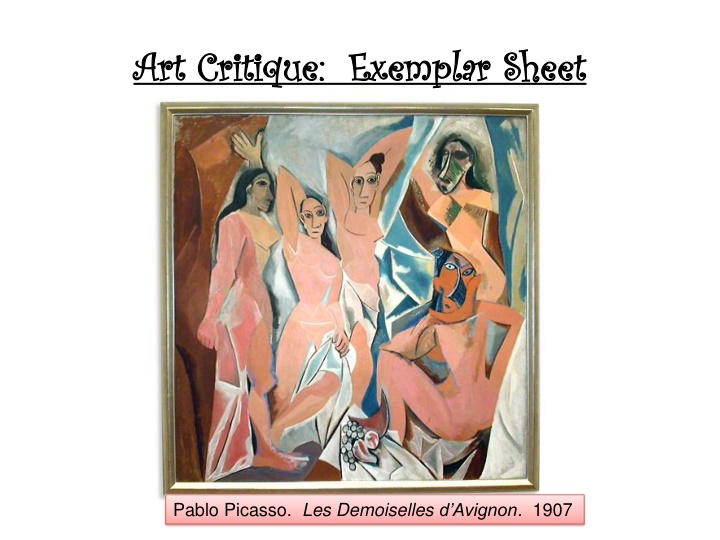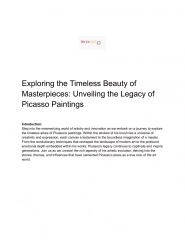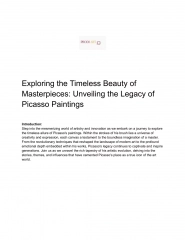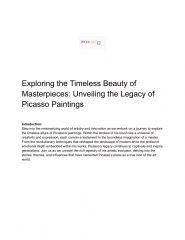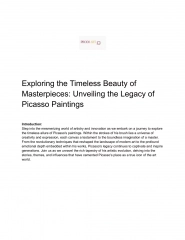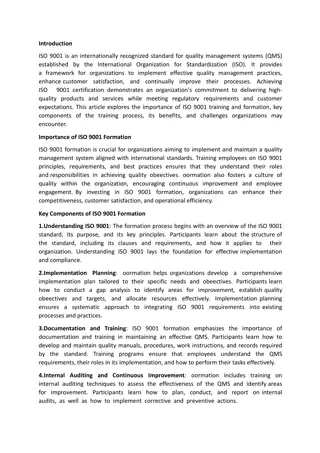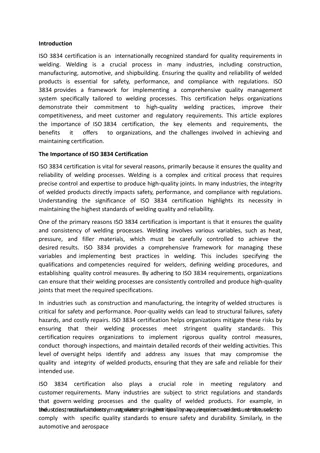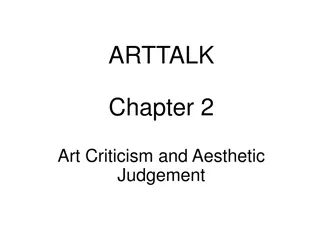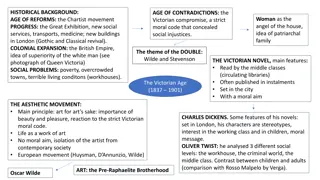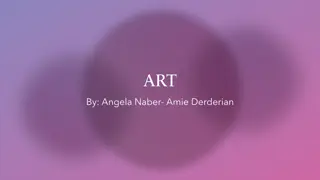Analyzing Pablo Picasso's "Les Demoiselles d'Avignon" - Art Critique
In this detailed art critique, we explore Pablo Picasso's iconic painting "Les Demoiselles d'Avignon" from 1907. The description, elements of design, and analysis focusing on principles like balance, emphasis, and harmony provide insight into the organization and depth of this groundbreaking artwork. Through a neutral lens, the composition, use of color, form, and line work are examined to reveal the artistry behind Picasso's portrayal of nude women in a unique and controversial setting.
Download Presentation

Please find below an Image/Link to download the presentation.
The content on the website is provided AS IS for your information and personal use only. It may not be sold, licensed, or shared on other websites without obtaining consent from the author.If you encounter any issues during the download, it is possible that the publisher has removed the file from their server.
You are allowed to download the files provided on this website for personal or commercial use, subject to the condition that they are used lawfully. All files are the property of their respective owners.
The content on the website is provided AS IS for your information and personal use only. It may not be sold, licensed, or shared on other websites without obtaining consent from the author.
E N D
Presentation Transcript
Art Critique: Exemplar Sheet Art Critique: Exemplar Sheet Pablo Picasso. Les Demoiselles d Avignon. 1907
ART CRITIQUE ART CRITIQUE 1. DESCRIPTION (What do you see?) Pablo Picasso a) Artist: Medium: Oil on Canvas Location: The Museum of Modern Art, New York Title: Year: Les Demoiselles d Avignon 1907 Size: 8 x 7 8 b) Describe the subject, objects, and details included in the work of art. State these facts without any opinion or persuasive words. There are five nude women prostitutes posing in a brothel. They are all staring out at the viewer. This brothel is located in Avignon, a red light district of Barcelona. There is fruit lying on a table in the foreground. c) Identify which of the 7 elements of design are used in this piece. (line, shape, colour, form, texture, value, space) Line, shape, colour, form, texture, value and space are all used in this piece.
ART CRITIQUE ART CRITIQUE 2. ANALYSIS (How is the work organized?) a) Identify THREE principles of design illustrated in the artwork (rhythm, movement, balance, proportion, variety, emphasis, harmony, unity) i) Balance ii) Emphasis iii) Harmony b) For each PRINCIPLE of design, explain how the ELEMENT(s) of design help illustrate that particular principle. i) Principle: Balance Explanation of how the ELEMENT(s) illustrates the principle in this artwork: Shape and line help illustrate balance because the sharp curves and angles of the female figures are repeated throughout not only the five figures, but in the drapery and curtains in the background, creating an equal visual weight. Form also helps create balance here because the female forms are all flattened into curving, geometric shapes. The orange fleshy colour of the figures skin is also consistent which helps create balance too.
ART CRITIQUE ART CRITIQUE 2. ANALYSIS (How is the work organized?) b) ii) Principle: Emphasis Explanation of how the ELEMENT(s) illustrates the principle in this artwork: Line helps create emphasis because the lines that make up the dark, almond-shaped eyes of the prostitutes and their angular noses and straight mouths contrast with the sharp, curved lines of their open arms and bodies. Because of the contrasting lines, the viewer is drawn to their hard gazes. Value also creates emphasis because the darker values that are shown on the left figure s face and the masks on the two right figures stand out against the orange flesh tones of their bodies. The blue colours in the background also draw the viewer s attention to the figures more since they are done in the complementary orange colour, thus creating emphasis. iii) Principle: Harmony Explanation of how the ELEMENT(s) illustrates the principle in this artwork: Shape and line create harmony throughout this composition because the triangular shape of the opened arms is repeated in most of the figures as well as the sharp curves of their legs. The angular lines of the figures limbs and fruit and the drapery in the background is also similar which harmonizes the whole piece, making the background and foreground come together as one. The light values that highlight the blue shapes in the background are repeated around the bodies, which also creates harmony throughout the piece.
ART CRITIQUE ART CRITIQUE 3. INTERPRETATION (What is the artist trying to communicate?) a) What is the message, theme, or mood of the work? The mood of the work seems to be hostile and aggressive. Picasso challenges the idea that women, even prostitutes, are easy access and instead presents an uncomfortable atmosphere where the prostitutes seem to challenge the viewer with a hard and confrontational gaze. The women are not presented as alluring or erotic but rather as cold, intimidating, and uninviting. b) Support your answer above by referring to specific visual facts/clues in the work of art. Your answer can also be based on your feelings as long as they are supported by specific observations. The hostile and aggressive mood is communicated by the way Picasso painted the prostitutes. He uses sharp angles and curves for their bodies and although they are all posed in inviting ways, their hard, blank gazes communicate a message of hostility. The African-inspired masks that cover the two women on the right seem to also illustrate that this is a hostile environment and create a protective barrier between the viewer and the subject. The fruit in the foreground, which is a traditional symbol of female sexuality has also been reduced to flat and sharp shapes, and leads the viewers eye up the bodies of the women, further emphasizing the aggressive atmosphere. Even the cold, highlighted, angular lines of the background make the women appear challenging to the viewer as they seem to mimic shards of glass.
ART CRITIQUE ART CRITIQUE 4. Judgment (Is it a successful work of art?) a) Subjective Judgment: Do you think this work of art is successful? Why or why not? (consider the subject and context of the painting, how the artist has organized the elements according to the principles of design, and the feeling the artwork gives you) I think this is a successful work of art because Picasso presented his subject matter, the prostitutes, in a way never before seen in the art world he flattened their shapes into angular curves and obscured some of their faces using African-like masks. Instead of painting the women in a soft, erotic way, he was able to communicate the feeling of a hostile environment by reducing their forms to curving geometric shapes and mask-like faces. His composition is well-balanced and the drapery in the background not only contrasts with the colours of the figures, drawing more attention to them, but also complements them because their folds are sharp just like the folds of the women s skin. This work of art is revolutionary because Picasso has discovered a new way to represent the human form while still communicating a powerful message about women. b) Personal Judgment: Do you like this work of art? Why or why not? (Remember, a work of art can be very successful aesthetically, but you may not want to live with it) I like this work of art because it signifies a break with the traditional way of presenting the human form. However, I would not want to live with it necessarily, only because the hard gazes of the females and their obvious hostility, make me uncomfortable. Picasso has done an excellent job making the viewer feel like the customer here.
